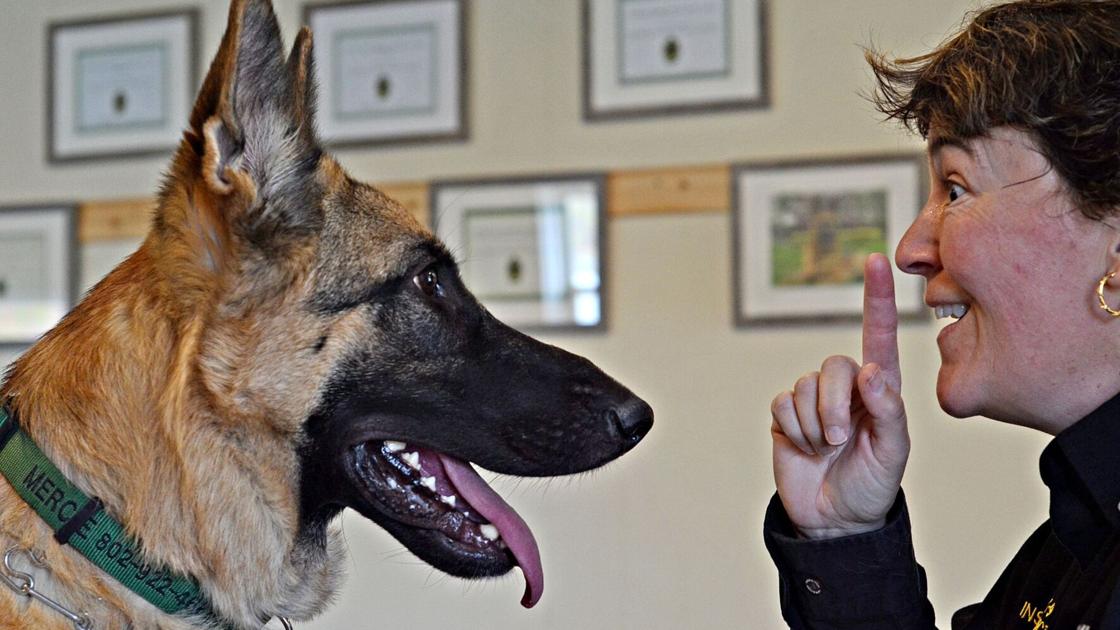
BENNINGTON — A nonprofit organization that matches veterans and first responders with service dogs and trains the new human-canine duos to work together has relocated to Bennington, and is searching for a permanent home in the county.
Vermont Paws and Boots moved to its current, temporary location at 114 Gage St. in December. The organization, formed in 2015, previously was based in Chittenden County.
Executive director and head K9 trainer Michelle LeBlanc, a retired Vermont State Police officer who also served for a time in the U.S. Army, said the group moved to the area with the idea that it could acquire more land for a facility for a lower price than in Chittenden County and more easily reach veterans and first responders in New York, Massachusetts and New Hampshire.
The coronavirus pandemic and its attendant real-estate boom, however, has complicated the group’s ongoing search for land in Bennington County, LeBlanc said. Ideally, the property would have five or more acres, ample space for a 4,000- to 6,000-square-foot training facility and housing for students as they train to become service-dog handlers.
The nonprofit has lost out on a half-dozen properties to buyers who made above-asking-price offers, LeBlanc said.
LeBlanc has Bennington roots, having graduated from Mount Anthony Union High School in 1988 before attending Norwich University.
The envisioned future facility would allow students to participate in the program full time, according to LeBlanc. At present, students — who may face hours-long commutes — train at the Gage Street location one to two days per week in a small class.
Since its inception, 18 students have graduated from the program, which takes nearly a year to complete, LeBlanc said. Another group of students is set to graduate in another month or two.
The program is aimed at military veterans and first responders — a category that includes but is not limited to firefighters, police officers and emergency medical technicians — who struggle with post-traumatic stress disorder, traumatic brain injury, military sexual trauma or physical disabilities. Potential students undergo an application process that requires letters of support from counselors and therapist, documentation of service, a home visit, an essay on why the applicant needs a service dog and a formal interview.
LeBlanc said reaching out for help is “a huge step” for veterans and first responders, who “have been taught our whole entire lives to run into danger and to be the strong, dominant ones.”
“’I really hurt today’ — that’s a hard thing for people to say,” LeBlanc said.
The search for the appropriate dog to match with an accepted student is also extensive, according to LeBlanc. The vast majority of the dogs are rescue dogs from the southern U.S.; the remainder are students’ pets that meet certain criteria, like a lack of history of aggression.
Once LeBlanc finds a dog with the suitable temperament and physical attributes for a given student, the potential teammates are introduced to one another to make sure they’re compatible.
The nonprofit retains ownership of the dog until the student completes the program, which is free for participants.
Through the program, the dogs learn to perform a variety of tasks for and with their handlers, like helping them get in and out of chairs, picking up items and attending to their handlers amid moments of anxiety or panic, said LeBlanc. Each student has particular needs, LeBlanc explained, but all pairs learn to carry out a broad range of tasks.
LeBlanc said one of the program’s mantras is “what we see, we can never un-see” — an acknowledgement of difficult past experiences — but she also advises that the use of a service dog can help handlers to lead more normal lives, allowing them to go shopping or attend a wedding without fear.
Students who graduate from the program are retested each year, LeBlanc said. Graduates sometimes return to help with classes and field questions from students.
The organization is embarking on a capital campaign to build the new potential facility, estimated before the pandemic to cost $1.5 million, LeBlanc said.
People interested in learning more about the nonprofit can visit its website, vermontpawsandboots.org, and Facebook page, facebook.com/VermontPaws.
"first" - Google News
April 28, 2021 at 06:30AM
https://ift.tt/3gWZqlZ
Nonprofit pairs vets, first responders with service dogs - Bennington Banner
"first" - Google News
https://ift.tt/2QqCv4E
https://ift.tt/3bWWEYd
Bagikan Berita Ini














0 Response to "Nonprofit pairs vets, first responders with service dogs - Bennington Banner"
Post a Comment